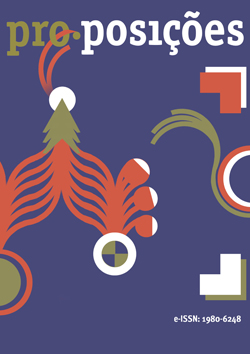Abstract
This articleessay, based on the social construcionist perspective, aims to present a methodological possibility for research based on relational, collaboration and dialogue principles. The text presents the theoretical bases of this perspective and is influences in carrying out scientific research. A relational research, that can also be defined as dialogic or collaborative, has as its center of attention the relationships between people, dialogue and collaborative work. Although its principles may be useful for various types of research, we tend to consider them to be much more concerned with research involving human beings, especially in the Social Sciences and Humanities. Theoretically, these researches are based on so-called postmodern perspectives that have as characteristics the criticism to the foundations of Modern Science as well as the social constructionism studies that assume that any knowledge is socially constructed. On the contrary, they invite researchers to open up new dialogues with their research subjects, inviting them to become co-constructors of research, creating spaces of inclusion and diversity within of scientific studies.
References
Anderson, H. (1999). Conversaciones, lenguaje y posibilidades: un enfoque posmoderno en la terapia Buenos Aires: Amorrortu Editores.
Defehr, J. N. (2008). Transforming encounters and interactions: a dialogical inquiry into the influence of collaborative therapy in the lives of its practitioners Dissertation. Tilburg University, in Tilburg, the Netherlands.
Defehr, J. (s.d). Investigación de acción dialógica: el fenómeno de agencia democrática y transformativa de la habilidad de respuesta Mimeo.
Defehr J., Adam, O., Barros, C., Rodriguez, S., & Wai, S. B. (2012, june 14). El “no saber” y “asumir” en los servicios sociales para refugiados e inmigrantes en Canadá: una investigación conversacional sobre la postura del terapeuta. International Journal of Collaborative Practices, 3(1), p. 89-103.
Freire, P. (1967). Educação como prática da liberdade Rio de Janeiro: Paz e Terra.
Freire, P. (1989). A importância do ato de ler: em três artigos que se completam 23a ed. São Paulo: Cortez.
Gadotti, M., Freire, P., Guimarães, S. (1995). Educar, ler, escrever e contar + ouvir, falar e gritar. In Pedagogia: diálogo e conflito 4a ed. São Paulo: Cortez.
Gergen, K. J. (2008). A psicologia social como história. Psicologia & Sociedade, 20(3): 475-484. (O texto original foi publicado em 1973, no Journal of Personality and Social Psychology, 26(2), 309-320.)
Gergen, K. J. (2007) Construccionismo social: aportes para el debate y la práctica. Bogotá: Universidad de los Andes, Facultad de Ciencias Sociales, Departamento de Psicología, CESO, Ediciones Uniandes.
Gergen, K. J.; Gergen, M. (2011) Reflexiones sobre la construcción social. Barcelona, Buenos Aires, México: Paidós.
Infante, C. L. S. (2003) Ser mujer: diálogos intergeneracionales. Tesis de Maestria. Instituto Kanankil. Mérida, México.
Martino, L. M. S. (2017) Teoria da comunicação: ideias, conceitos e métodos. Petrópolis: Vozes.
Mcnamee, S. (2015, november, 15) Presencia radical: alternativas para el estado terapéutico. European Journal of Psychotherapy and Counselling, 17(4), 1-10.
Mcnamee, S. (2014) Research as a relational practice. In Simon, G; Chard, A. (Eds.). Systemic inquiry: innovations in reflexive practice research. London: Everything is connected Press, 74-94.
Piramide de la Superioridad Moral. Recuperado de https://evolucionyneurociencias.blogspot.com/2016/12/la-ilusion-de-superioridad-moral.html Acesso em 18 nov. 2020 29 set. 2018.
Shotter, J. (2012) Más que la fría razón: “pensar com” o “pensamiento sistémico” y “pensar acerca de sistemas”. International Journal of Colaborative Practices. 3(1), p. 14-27.

This work is licensed under a Creative Commons Attribution 4.0 International License.
Copyright (c) 2021 Rita de Cássia de Souza


